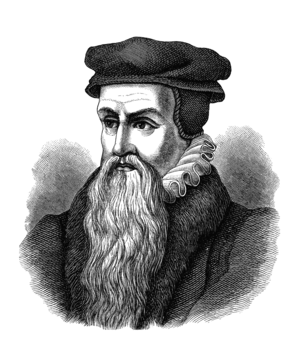
Theodore Beza
1519–1605
The First Calvinist
By Shawn Wright
Theodore Beza was born into the lower nobility of France and given an excellent education there in preparation for his career as a lawyer. In God’s good providence, at the age of nine he was sent to study under Melchior Wolmar, a German Lutheran, who not only taught him Greek and Latin, but also taught Beza of Christ. Beza said of the beginning of Wolmar’s tutelage that it was “the beginning of all the good things which I have received from that time forward and which I trust to receive hereafter in my future life.”
Calvin’s Co-Pilot
After completing his education, though, Beza led a dissolute life in Paris for about a decade until he was bedridden and near death for a time. Then, in 1548, God brought him to his senses. Beza returned to his commitment to Jesus and fled France for the Reformed cause in Switzerland. He began teaching pastors in Lausanne, and in 1558 was called to Geneva to serve under John Calvin. Beza and Calvin developed a close bond in the last years of the latter’s life. Calvin wrote that he cared “deeply for Beza, who loves me more than a brother and honors me more than a father.”
Apart from a few trips outside the Swiss city-state, Beza spent the rest of his life in Geneva — often under trying conditions. He never knew if Catholics would invade the city and slaughter its inhabitants, and he had to battle the rising tide of Lutheran polemics against the Reformed Protestants.
Geneva’s Defender
Beza left his mark on the Reformation in several ways. First, on him fell the burden of leadership of the Genevan Reformation after Calvin died in 1564. For the next forty years, Beza served as pastor and professor, traveled to France to aid the beleaguered Protestants there, and debated Catholics and Lutherans.

John Calvin was undoubtedly the father of Calvinism, but Beza very well may have been the first Calvinist. He also gave form to what we now call Calvinism by explaining and defending the biblical doctrines Calvin had rediscovered. Through his teaching and writing ministry, Beza defended the imputation of Christ’s righteousness as essential to a sinner’s justification, he explained the justice of double predestination, and he expounded the comfort a believer receives from Christ’s definite atonement.
In addition to his pastoral leadership, Beza gave the young French-speaking Reformed church necessary literature to aid its growth. During his lifetime, Beza was best known for his work on the New Testament, culminating in his Annotations of the New Testament. This linguistic masterpiece included the Greek text of the New Testament, the Latin Vulgate translation, and Beza’s original Latin translation. Beza added his textual footnotes and explanatory notes, demonstrating that the Reformed faith was distinctly biblical. His notes in the Annotations influenced the 1560 English Bible translation, the Geneva Bible, which became the most popular Bible translation among the Puritans. The Greek text Beza published was that used by the translators of the 1611 King James Bible.
Under God’s Mighty Hand
Beza inherited Calvin’s biblical vision of God’s sweet sovereignty over all the affairs of human life. After Calvin’s death, Beza lived through tumultuous times, experiencing trials that would force him to trust in his Lord. In 1587, for instance, when it looked like Geneva was about to be overrun by Catholics, Beza encouraged his congregation to trust in their heavenly Father’s kind providence:
“This doctrine is full of excellent comfort. For thereby we understand, that by the power of our God, the rage of that hungry lion is abated and bridled, and that God will never suffer him to do anything against his children, which shall not be to their good and profit, as the apostle tells us (Romans 8:28) and also teaches us by his own example (2 Corinthians 12:17).”
Indeed, he told his listeners, our only hope is that our God is sovereign — so sovereign that he can save us from our sins when we are utterly dead spiritually:
“There is in our nature nothing but most desperate and most obstinate rebellion, until the Spirit of God do drive away, first, the darkness of our understanding, which cannot, nor will not of itself, so much as think upon the things of God (2 Corinthians 3:5) and that secondly it correct the forwardness of our will, which is an enemy of God, and of whatsoever is truly good (Romans 5:10 and 8:7).”
Beza saw that because God reigns and has all power, Christians can hope in his goodness both to save them and to protect them through the dangers of their earthly pilgrimage.
Recent Comments